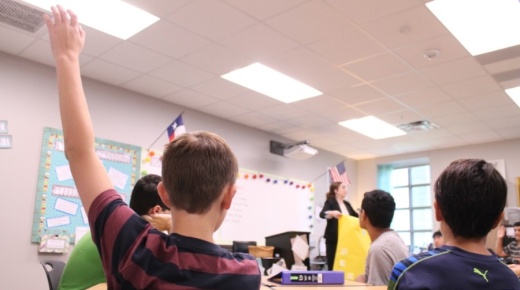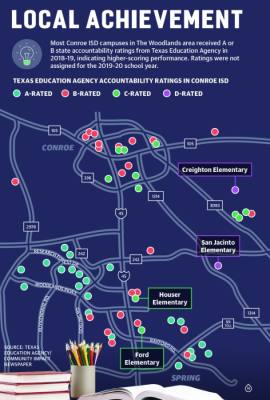Traditional state-level metrics including students’ annual State of Texas Assessments of Academic Readiness, or STAAR, scores as well as school evaluations through the Texas Education Agency’s accountability rating system, were canceled in the spring. As a result, scores and related plans were carried over from 2018-19, including Conroe ISD’s overall B accountability rating.
The state-level appraisals measure student progress in CISD and whether schools must submit an improvement plan. Officials said the district has used its own assessments and progress markers to keep tabs on its students this year.“We just basically shifted gears and started analyzing other pieces of data that we get in addition to STAAR like federal reports,” said Tamika Taylor, CISD’s executive director for school improvement and leadership development.
Still, the 2018-19 scores continue to influence some measures of progress on CISD campuses. Some lower-performing campuses placed on targeted intervention plans or receiving support based on previous lower ratings are still engaged with those efforts, officials said. For example, Houston Elementary in Conroe remains on an intervention plan due to a previous lower state rating, and district trustees unanimously approved the plan’s continued implementation for the 2020-21 school year in September.
Local campus focus
The majority of campuses in The Woodlands area, including The Woodlands, College Park, Oak Ridge and Grand Oaks high school feeder zones, are working from A or B grades received in 2018-19. Just two campuses in The Woodlands area, Houser and Ford elementaries, received C ratings from the TEA during the previous rating period, while nine campuses in the district’s other two feeder zones received C ratings.
Officials said achieving high campus performances is a goal throughout the district, regardless of initial scores. But even at schools coming off of positive evaluations, maintaining campus progress and culture has required additional attention from instructors and administrators.
“One of the challenges I’ve seen this year ... is we’re going to have increased absenteeism,” Deputy Superintendent Chris Hines said. “It’s been a challenging year, not just picking up where we left off but also managing the day-to-day cases and having people in and out.”
Even as the district remains focused on improvement areas, the status of state appraisals heading into 2021 may change. Dozens of state lawmakers in November called on the TEA to once again cancel STAAR testing due to the pandemic. As of mid-November, Hines said the district is still planning to administer STAAR tests in the spring, while additional internal reviews remain in place.“As we head into the next couple of months and predicting for next year, we continue to operate under what the state called an effective schools framework,” Taylor said. “We need to make sure that our kids that are in-person and our kids that are remote learners are receiving the type of instruction that they need. And that has been a challenge that we continue to focus on.”






